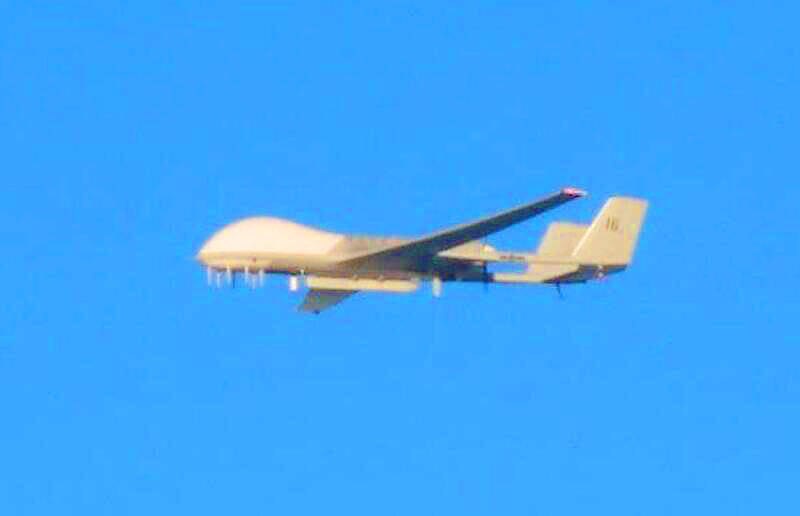China appears to be using a new type of BZK-005 drone that might be capable of disrupting the radio communications in the Taiwanese military and causing the radar system to malfunction, a military source said yesterday.
The military is closely monitoring traces of this upgraded drone after the Japanese Ministry of Defense recently captured images of a BZK-005 drone, which had a large number of antennas under the nose of the aircraft and a pod of unknown purpose attached under the belly of the craft.
Defense experts in other countries had warned that the Chinese People’s Liberation Army (PLA) has bolstered its electronic warfare capability by installing antennaes and pods on some of the drones, a military source told the Liberty Times (sister paper of the Taipei Times), adding that they could be deployed to disrupt all radio communications within the chain of command in the Taiwanese military and cause the radar system to malfunction.

Photo: Screen grab from Japan’s Ministry of Defense Web site
Drones equipped with electronic warfare capabilities would also make it difficult for the Taiwanese military to accurately launch missile attacks and intercept Chinese missiles and aircraft.
The PLA would attempt to use such interference in the initial stage of a possible invasion in Taiwan and during an attack of on the country, they said.
The US military also warned that the PLA might use a swarm of small drones equipped with microwave reconnaissance jamming or electromagnetic weapons to fly into Taiwanese airspace and conduct various jamming operations, they added.
The new BZK-005 reconnaissance drone was spotted on Friday last week, when it flew to the west Pacific via the airspace between Okinawa Island and Miyako Island and flew back using the same route, based on the information made public by the Japanese Ministry of Defense.
The PLA uses BZK-005 and TB-001 drones to fly to Taiwan’s air defense identification zone, as both have reconnaissance and attack capabilities. The former is a large and multifunctional drone, with a maximum endurance time of up to 40 hours. Its cruising altitude could reach 3,000m to 7,000m.
In other news, Minister of Economic Affairs J.W. Kuo (郭智輝) yesterday said in an opening ceremony of the Asia Drone AI Innovation and Application Expo in Chiayi County that some drone manufacturers from the US are to come to Taiwan next month to seek business opportunities.
“I have talked with National Development Council Minister Paul Liu (劉鏡清) about the issues with the drone industry, who said that the National Development Fund should be used to support the industry, as it is important to the country,” Kuo said.
“Although there are not enough drone manufacturers in Taiwan, we are looking to expand the scale of the industry with the US,” he said.
“We also hope that the industry could generate an output value of NT$30 billion [US$925 million] by 2028,” he added.

AIR SUPPORT: The Ministry of National Defense thanked the US for the delivery, adding that it was an indicator of the White House’s commitment to the Taiwan Relations Act Deputy Minister of National Defense Po Horng-huei (柏鴻輝) and Representative to the US Alexander Yui on Friday attended a delivery ceremony for the first of Taiwan’s long-awaited 66 F-16C/D Block 70 jets at a Lockheed Martin Corp factory in Greenville, South Carolina. “We are so proud to be the global home of the F-16 and to support Taiwan’s air defense capabilities,” US Representative William Timmons wrote on X, alongside a photograph of Taiwanese and US officials at the event. The F-16C/D Block 70 jets Taiwan ordered have the same capabilities as aircraft that had been upgraded to F-16Vs. The batch of Lockheed Martin

GRIDLOCK: The National Fire Agency’s Special Search and Rescue team is on standby to travel to the countries to help out with the rescue effort A powerful earthquake rocked Myanmar and neighboring Thailand yesterday, killing at least three people in Bangkok and burying dozens when a high-rise building under construction collapsed. Footage shared on social media from Myanmar’s second-largest city showed widespread destruction, raising fears that many were trapped under the rubble or killed. The magnitude 7.7 earthquake, with an epicenter near Mandalay in Myanmar, struck at midday and was followed by a strong magnitude 6.4 aftershock. The extent of death, injury and destruction — especially in Myanmar, which is embroiled in a civil war and where information is tightly controlled at the best of times —

Taiwan was ranked the fourth-safest country in the world with a score of 82.9, trailing only Andorra, the United Arab Emirates and Qatar in Numbeo’s Safety Index by Country report. Taiwan’s score improved by 0.1 points compared with last year’s mid-year report, which had Taiwan fourth with a score of 82.8. However, both scores were lower than in last year’s first review, when Taiwan scored 83.3, and are a long way from when Taiwan was named the second-safest country in the world in 2021, scoring 84.8. Taiwan ranked higher than Singapore in ninth with a score of 77.4 and Japan in 10th with

SECURITY RISK: If there is a conflict between China and Taiwan, ‘there would likely be significant consequences to global economic and security interests,’ it said China remains the top military and cyber threat to the US and continues to make progress on capabilities to seize Taiwan, a report by US intelligence agencies said on Tuesday. The report provides an overview of the “collective insights” of top US intelligence agencies about the security threats to the US posed by foreign nations and criminal organizations. In its Annual Threat Assessment, the agencies divided threats facing the US into two broad categories, “nonstate transnational criminals and terrorists” and “major state actors,” with China, Russia, Iran and North Korea named. Of those countries, “China presents the most comprehensive and robust military threat